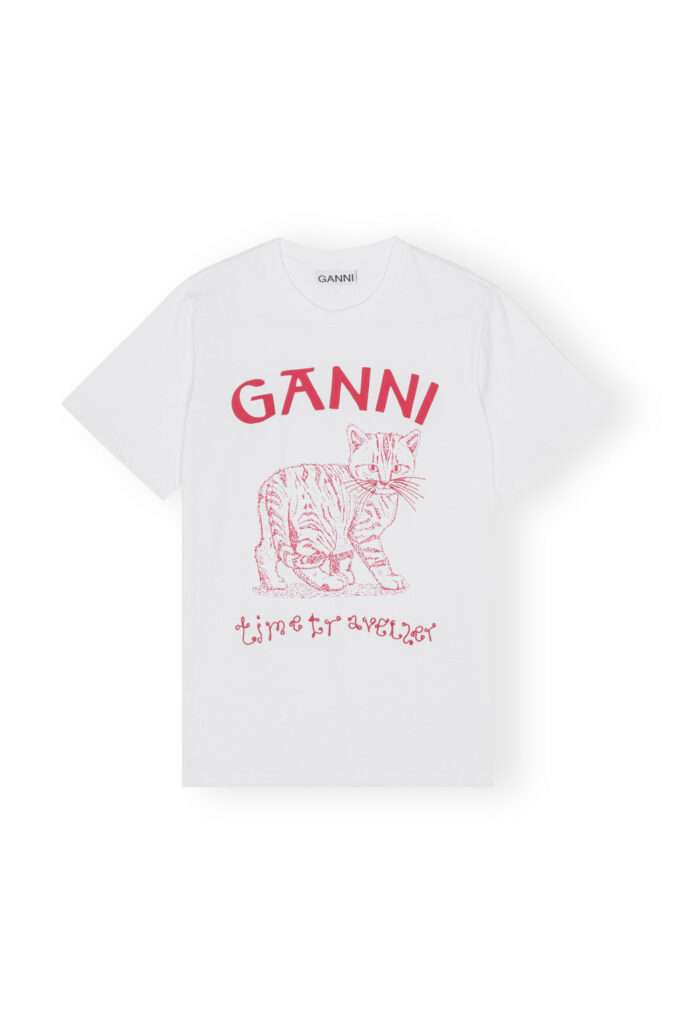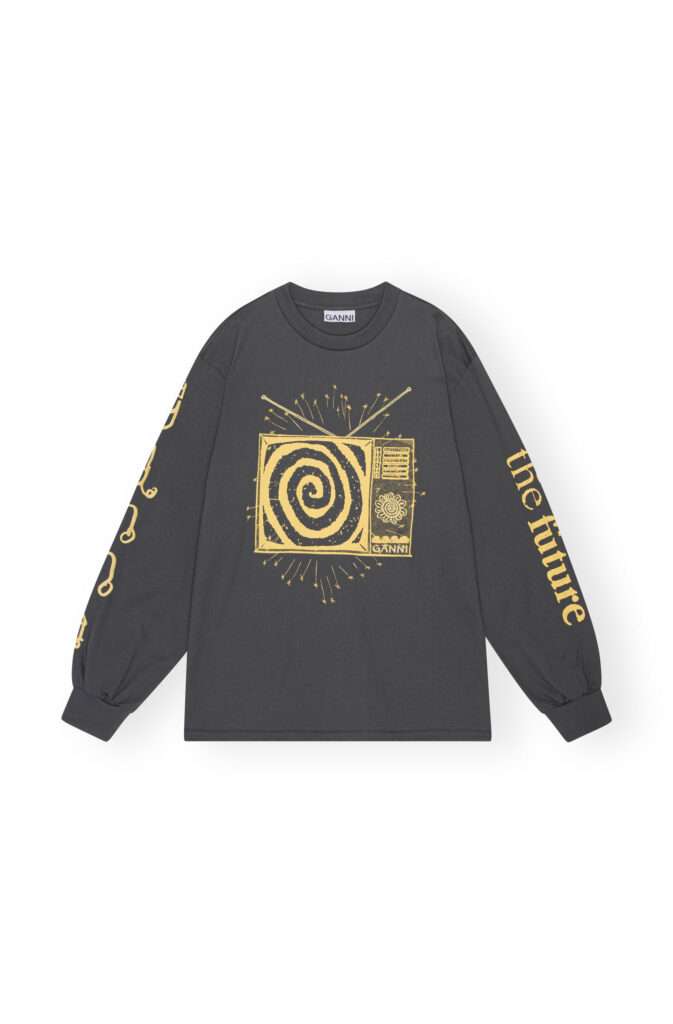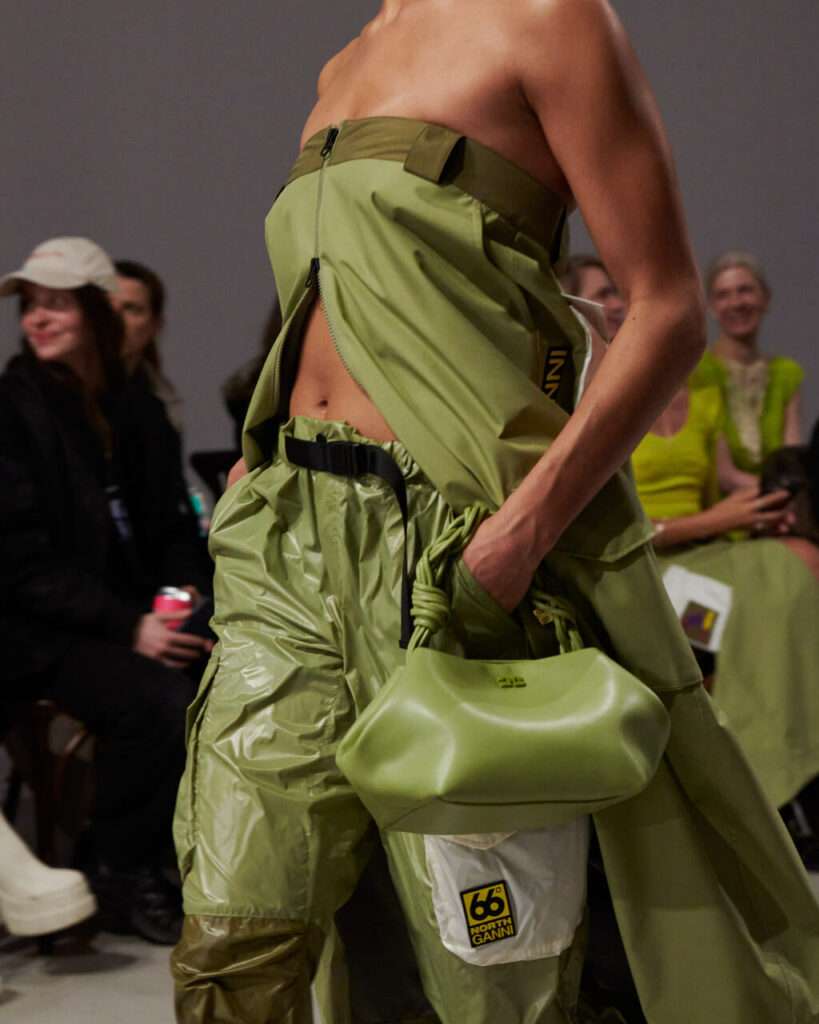Danish luxury label Ganni has announced the launch of an in-house recycling initiative and a CO2 fabric partnership as part of its decarbonization efforts and sustainability commitments.
The new recycling scheme will see Ganni recycle its cut-off production scraps and turn them into new clothing. The initiative is aimed at curbing the waste that comes from fashion supply chains, where up to a quarter of all fabrics end up as cut-offs during the garment production process and are discarded as waste or downcycled into various forms of insulation. Ganni currently down-cycles all current cut-off waste.
Ganni produces 12 tonnes of cotton scraps annually, and the off-cuts will now be recycled in-house and reintroduced into its production cycle. The new recycled yarn that the brand has developed contains 50 percent recycled cotton scraps and 50 percent GOTS-certified cotton and will be used to produce T-shirts. The first garments produced using the recycling scheme will launch in May with Ganni’s pre-autumn/winter 2023 collection.

“Fashion supply chains are immensely complex and opaque, so things like waste streams are often ignored,” Ganni founder Nicolaj Reffstrup said in a statement. “We need to analyze and understand our production processes in more detail to allow for small but majorly important improvements like this to happen. For us, this is a great case study that can be rolled out with more suppliers over time.”
Ganni’s recycling initiative addresses a growing issue that has been at the forefront of the fashion industry in recent years. According to a report by the Ellen MacArthur Foundation, the fashion industry is responsible for ten percent of global carbon emissions, while the United Nations Environment Programme (UNEP) notes that textile production alone contributes more to climate change than international aviation and shipping emissions combined.
Ganni, which recently earned the highest B Corp score for a fashion company, has also implemented a series of initiatives aimed at reducing its carbon footprint, including the use of renewable energy sources in its stores and offices. The company has also made efforts to reduce the amount of waste produced during its manufacturing processes, such as reducing water usage and implementing eco-friendly packaging.
Ganni’s recycling initiative comes as textile producer Rubi announced its initial strategic pilot partnerships with global fashion brands, including Ganni, along with Reformation, Nuuly, H&M, and Patagonia.

“Up to two-thirds of fashion’s environmental impact happens at the raw materials stage, before clothing is even produced, which means investing in next-generation materials is absolutely critical,” Kathleen Talbot, Chief Sustainability Officer and VP of Operations at Reformation, said in a statement. “Innovations like Rubi are not only key to helping Reformation achieve Climate Positivity, but also play an important role in building a future for fashion that is actually hopeful and inspiring.”
Rubi, which was founded by sisters Neeka and Leila Mashouf of the Bebe Stores Mashouf family, is on a mission to restore the Earth’s ecological balance by reimagining supply chains that are symbiotic with the planet.
The company uses biochemical processes powered by enzymes at an industrial scale to “eat” carbon emissions and make carbon-negative, resource-neutral textiles. Rubi’s patent-pending, cell-free biocatalysis process captures and converts CO2 from the waste streams of manufacturing facilities into cellulose, which is used to create lyocell yarn that can be used for clothing and materials. One hundred percent of the CO2 inputted to the end product is done with zero waste.
To achieve its goal, Rubi has secured $8.7 million in a Seed Series funding round led by Talis Capital, alongside Patagonia’s Tin Shed Ventures, H&M Group, Collaborative Fund, and Necessary Ventures. The new raise brings Rubi’s total funding to $13.5 million.

“At Talis we strongly believe that now is the time for companies to make strides in decarbonising existing industries by leveraging advances in synthetic biology, biomanufacturing and machine learning,” said Matus Maar, Managing Partner at Talis Capital. “We have been lucky enough to continue partnering with Neeka, Leila and the entire Rubi team as they progress on their mission to decarbonise supply chains and re-think how we produce materials in harmony with the planet.”
Sophie Bakalar, Venture Partner at Collaborative Fund echoed the sentiment, saying that decarbonizing the textile industry is “no small feat.”
“Rubi’s cell-free catalysis process could revolutionize biomanufacturing and we’re thrilled to be supporting them,” Bakalar said.
Reffstrup praised Rubi for its exciting fabric development that has the potential to be climate positive “as it looks to sequester carbon from the atmosphere in various manufacturing processes,” Reffstrup said. Ganni recently introduced several novel fabrics made from upcycled materials, including a leather handbag made from upcycled fruit.
“We ultimately need to get to a place where we can create products that leave a truly positive impact,” Reffstrup added. “Fabric innovations will play a crucial role in getting fashion to that point, but for this to happen brands need to place bets and take risks. This is why we’re committed to supporting and investing in breakthrough fabric innovations like Rubi Laboratories through our innovation initiative ‘Fabrics of the Future’.”
Related on Ethos:


